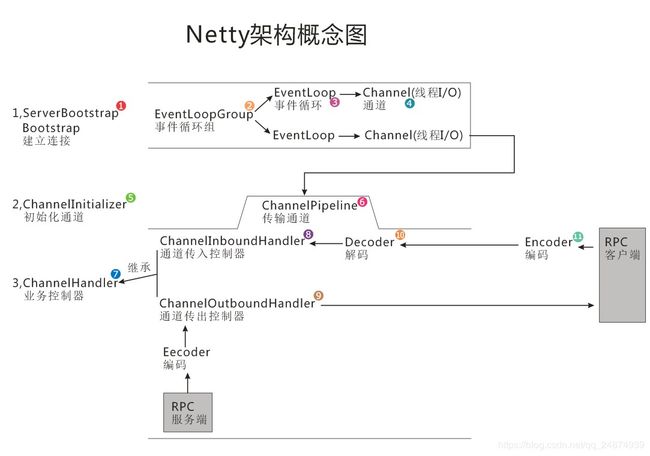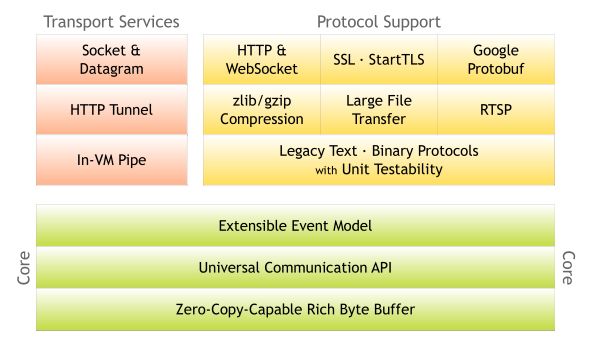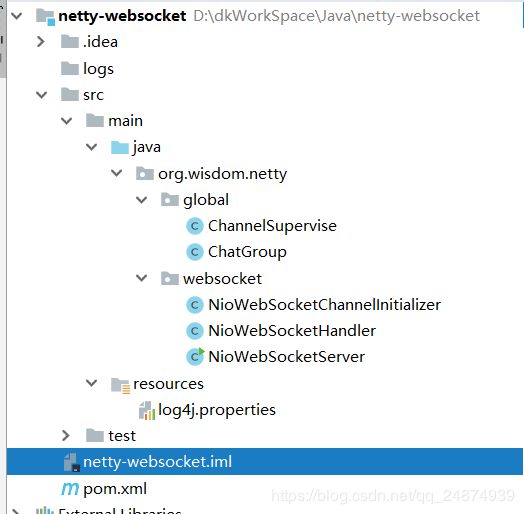基于netty搭建websocket,实现消息的主动推送
netty是由jboss提供的一款开源框架,常用于搭建RPC中的TCP服务器、websocket服务器,甚至是类似tomcat的web服务器,反正就是各种网络服务器,在处理高并发的项目中,有奇用!功能丰富且性能良好,基于java中NIO的二次封装,具有比原生NIO更好更稳健的体验。
netty的核心架构
1.项目结构
- 核心依赖:
<dependencies>
<dependency>
<groupId>io.nettygroupId>
<artifactId>netty-allartifactId>
<version>4.1.6.Finalversion>
dependency>
<dependency>
<groupId>com.fasterxml.jackson.coregroupId>
<artifactId>jackson-databindartifactId>
<version>2.9.7version>
dependency>
<dependency>
<groupId>log4jgroupId>
<artifactId>log4jartifactId>
<version>1.2.17version>
dependency>
dependencies>
代码
1.启动类
public class NioWebSocketServer {
private final Logger logger=Logger.getLogger(this.getClass());
private void init(){
logger.info("正在启动websocket服务器");
NioEventLoopGroup boss=new NioEventLoopGroup();
NioEventLoopGroup work=new NioEventLoopGroup();
try {
ServerBootstrap bootstrap=new ServerBootstrap();
bootstrap.group(boss,work);
bootstrap.channel(NioServerSocketChannel.class);
bootstrap.childHandler(new NioWebSocketChannelInitializer());
Channel channel = bootstrap.bind(8081).sync().channel();
logger.info("webSocket服务器启动成功:"+channel);
channel.closeFuture().sync();
} catch (InterruptedException e) {
e.printStackTrace();
logger.info("运行出错:"+e);
}finally {
boss.shutdownGracefully();
work.shutdownGracefully();
logger.info("websocket服务器已关闭");
}
}
public static void main(String[] args) {
new NioWebSocketServer().init();
}
}
netty搭建的服务器基本上都是差不多的写法:
-
绑定主线程组和工作线程组,这部分对应架构图中的事件循环组
-
只有服务器才需要绑定端口,客户端是绑定一个地址
-
配置channel(数据通道)参数,重点就是
ChannelInitializer的配置 -
以异步的方式启动,最后是结束关闭两个线程组
2.ChannelInitializer写法
public class NioWebSocketChannelInitializer extends ChannelInitializer<SocketChannel> {
@Override
protected void initChannel(SocketChannel ch) {
ch.pipeline().addLast("logging",new LoggingHandler("DEBUG"));//设置log监听器,并且日志级别为debug,方便观察运行流程
ch.pipeline().addLast("http-codec",new HttpServerCodec());//设置解码器
ch.pipeline().addLast("aggregator",new HttpObjectAggregator(65536));//聚合器,使用websocket会用到
ch.pipeline().addLast("http-chunked",new ChunkedWriteHandler());//用于大数据的分区传输
ch.pipeline().addLast("handler",new NioWebSocketHandler());//自定义的业务handler
}
}
3.自定义的处理器NioWebSocketHandler
public class NioWebSocketHandler extends SimpleChannelInboundHandler<Object> {
private final Logger logger=Logger.getLogger(this.getClass());
private WebSocketServerHandshaker handshaker;
@Override
protected void channelRead0(ChannelHandlerContext ctx, Object msg) throws Exception {
logger.debug("收到消息:"+msg);
if (msg instanceof FullHttpRequest){
//以http请求形式接入,但是走的是websocket
handleHttpRequest(ctx, (FullHttpRequest) msg);
}else if (msg instanceof WebSocketFrame){
//处理websocket客户端的消息
handlerWebSocketFrame(ctx, (WebSocketFrame) msg);
}
}
@Override
public void channelActive(ChannelHandlerContext ctx) throws Exception {
//添加连接
logger.debug("客户端加入连接:"+ctx.channel());
ChannelSupervise.addChannel(ctx.channel());
}
@Override
public void channelInactive(ChannelHandlerContext ctx) throws Exception {
//断开连接
logger.debug("客户端断开连接:"+ctx.channel());
ChannelSupervise.removeChannel(ctx.channel());
}
@Override
public void channelReadComplete(ChannelHandlerContext ctx) throws Exception {
ctx.flush();
}
private void handlerWebSocketFrame(ChannelHandlerContext ctx, WebSocketFrame frame){
// 判断是否关闭链路的指令
if (frame instanceof CloseWebSocketFrame) {
handshaker.close(ctx.channel(), (CloseWebSocketFrame) frame.retain());
return;
}
// 判断是否ping消息
if (frame instanceof PingWebSocketFrame) {
ctx.channel().write(
new PongWebSocketFrame(frame.content().retain()));
return;
}
// 本例程仅支持文本消息,不支持二进制消息
if (!(frame instanceof TextWebSocketFrame)) {
logger.debug("本例程仅支持文本消息,不支持二进制消息");
throw new UnsupportedOperationException(String.format(
"%s frame types not supported", frame.getClass().getName()));
}
// 返回应答消息
String request = ((TextWebSocketFrame) frame).text();
logger.debug("服务端收到:" + request);
TextWebSocketFrame tws = new TextWebSocketFrame(new Date().toString()
+ ctx.channel().id() + ":" + request);
// 群发
ChannelSupervise.send2All(tws);
// 返回【谁发的发给谁】
// ctx.channel().writeAndFlush(tws);
}
/**
* 唯一的一次http请求,用于创建websocket
* */
private void handleHttpRequest(ChannelHandlerContext ctx,
FullHttpRequest req) {
//要求Upgrade为websocket,过滤掉get/Post
if (!req.decoderResult().isSuccess()
|| (!"websocket".equals(req.headers().get("Upgrade")))) {
//若不是websocket方式,则创建BAD_REQUEST的req,返回给客户端
sendHttpResponse(ctx, req, new DefaultFullHttpResponse(
HttpVersion.HTTP_1_1, HttpResponseStatus.BAD_REQUEST));
return;
}
WebSocketServerHandshakerFactory wsFactory = new WebSocketServerHandshakerFactory(
"ws://localhost:8081/websocket", null, false);
handshaker = wsFactory.newHandshaker(req);
if (handshaker == null) {
WebSocketServerHandshakerFactory
.sendUnsupportedVersionResponse(ctx.channel());
} else {
handshaker.handshake(ctx.channel(), req);
}
}
/**
* 拒绝不合法的请求,并返回错误信息
* */
private static void sendHttpResponse(ChannelHandlerContext ctx,
FullHttpRequest req, DefaultFullHttpResponse res) {
// 返回应答给客户端
if (res.status().code() != 200) {
ByteBuf buf = Unpooled.copiedBuffer(res.status().toString(),
CharsetUtil.UTF_8);
res.content().writeBytes(buf);
buf.release();
}
ChannelFuture f = ctx.channel().writeAndFlush(res);
// 如果是非Keep-Alive,关闭连接
if (!isKeepAlive(req) || res.status().code() != 200) {
f.addListener(ChannelFutureListener.CLOSE);
}
}
}
执行流程是:
- web发起一次类似是http的请求,并在
channelRead0方法中进行处理,并通过instanceof去判断帧对象是FullHttpRequest还是WebSocketFrame,建立连接是时候会是FullHttpRequest - 在
handleHttpRequest方法中去创建websocket,首先是判断Upgrade是不是websocket协议,若不是则通过sendHttpResponse将错误信息返回给客户端,紧接着通过WebSocketServerHandshakerFactory创建socket对象并通过handshaker握手创建连接 - 在连接创建好后的所以消息流动都是以
WebSocketFrame来体现 - 在
handlerWebSocketFrame去处理消息,也可能是客户端发起的关闭指令,ping指令等等
4.保存客户端的信息
当有客户端连接时候会被channelActive监听到,当断开时会被channelInactive监听到,一般在这两个方法中去保存/移除客户端的通道信息,而通道信息保存在ChannelSupervise中:
public class ChannelSupervise {
private static ChannelGroup GlobalGroup=new DefaultChannelGroup(GlobalEventExecutor.INSTANCE);
private static ConcurrentMap<String, ChannelId> ChannelMap=new ConcurrentHashMap();
public static void addChannel(Channel channel){
GlobalGroup.add(channel);
ChannelMap.put(channel.id().asShortText(),channel.id());
}
public static void removeChannel(Channel channel){
GlobalGroup.remove(channel);
ChannelMap.remove(channel.id().asShortText());
}
public static Channel findChannel(String id){
return GlobalGroup.find(ChannelMap.get(id));
}
public static void send2All(TextWebSocketFrame tws){
GlobalGroup.writeAndFlush(tws);
}
}
ChannelGroup是netty提供用于管理web于服务器建立的通道channel的,其本质是一个高度封装的set集合,在服务器广播消息时,可以直接通过它的writeAndFlush将消息发送给集合中的所有通道中去。但在查找某一个客户端的通道时候比较坑爹,必须通过channelId对象去查找,而channelId不能人为创建,所有必须通过map将channelId的字符串和channel保存起来。
为什么不能人为创建channelId:
1.channelId是实现类DefaultChannelId这一点可以通过debug它的find发现:

而DefaultChannelId中不提供任何修改channelId的操作,并且由final修飾不能被继承:
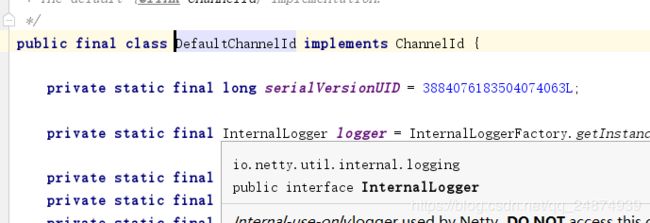
而我们获取的字符串形式的channelId实际上是它创建时候通过一定的算法生成的。
想要获取channel信息还是老老实实的封装一个map去维护字符串形式的id于channel的对应关系吧。
测试运行
客户端代码,只需要javascript的内置对象websocket即可:
var socket;
if(!window.WebSocket){
window.WebSocket = window.MozWebSocket;
}
if(window.WebSocket){
socket = new WebSocket("ws://localhost:8081/websocket");
socket.onmessage = function(event){
var ta = document.getElementById('responseText');
ta.value += event.data+"\r\n";
};
socket.onopen = function(event){
var ta = document.getElementById('responseText');
ta.value = "打开WebSoket 服务正常,浏览器支持WebSoket!"+"\r\n";
};
socket.onclose = function(event){
var ta = document.getElementById('responseText');
ta.value = "";
ta.value = "WebSocket 关闭"+"\r\n";
};
}else{
alert("您的浏览器不支持WebSocket协议!");
}
function send(message){
if(!window.WebSocket){return;}
if(socket.readyState == WebSocket.OPEN){
socket.send(message);
}else{
alert("WebSocket 连接没有建立成功!");
}
}
给出一个websocket的参考API地址:https://developer.mozilla.org/zh-CN/docs/Web/API/WebSocket/WebSocket
当web通过websocket对象连接成功后后台代码:
GET /websocket HTTP/1.1
Host: localhost:8081
Connection: Upgrade
Pragma: no-cache
Cache-Control: no-cache
Upgrade: websocket
Origin: file://
Sec-WebSocket-Version: 13
User-Agent: Mozilla/5.0 (Windows NT 10.0; Win64; x64) AppleWebKit/537.36 (KHTML, like Gecko) Chrome/72.0.3626.109 Safari/537.36
Accept-Encoding: gzip, deflate, br
Accept-Language: zh-CN,zh;q=0.9
Sec-WebSocket-Key: nJizI32hwlBOiORpLJUTDA==
Sec-WebSocket-Extensions: permessage-deflate; client_max_window_bits
content-length: 0
主要是Upgrade: websocket。如果直接在浏览器输入http://localhost:8081/websocket

后台输出:
GET /favicon.ico HTTP/1.1
Host: localhost:8081
Connection: keep-alive
User-Agent: Mozilla/5.0 (Windows NT 10.0; Win64; x64) AppleWebKit/537.36 (KHTML, like Gecko) Chrome/72.0.3626.109 Safari/537.36
Accept: image/webp,image/apng,image/*,*/*;q=0.8
Referer: http://localhost:8081/websocket
Accept-Encoding: gzip, deflate, br
Accept-Language: zh-CN,zh;q=0.9
Cookie: Idea-8e0020a7=5b26e4b3-9f9e-43e0-9a47-308f93716d8a; Webstorm-c460d780=4381b95f-1a24-483f-a5cf-902eec88b795
content-length: 0
对比可以发现请求头中缺少很多websocket的内容
而浏览器相应到的bad reques对应NioWebSocketHandler的sendHttpResponse的最后一个参数:

发送消息后:
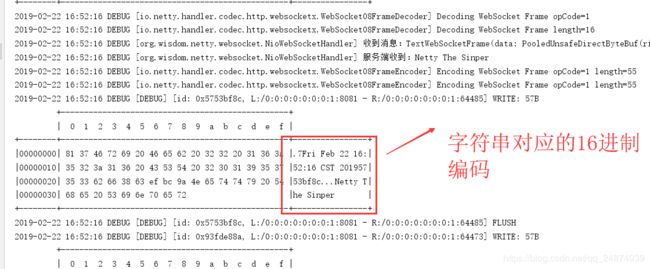
前端收到服务端推送的消息后:
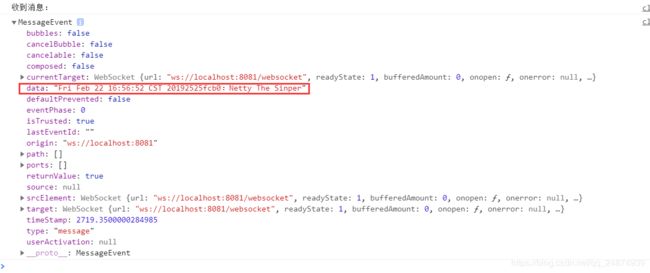
前端需要在方法websocket.onmessage=function(messageEvent){}通过messageEvent.data捕获消息
代码下载地址:https://github.com/Siwash/websocketWithNetty
